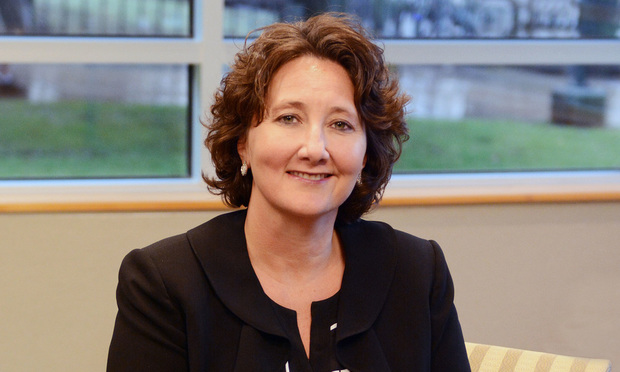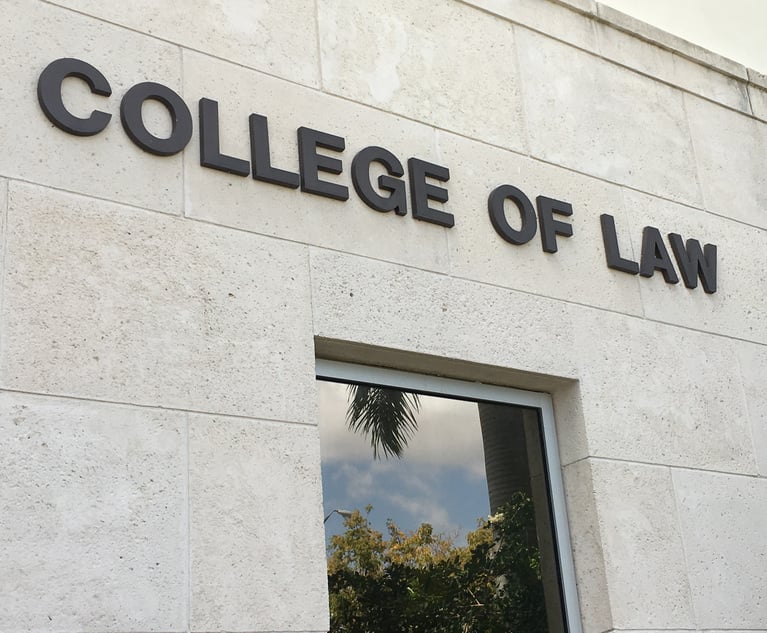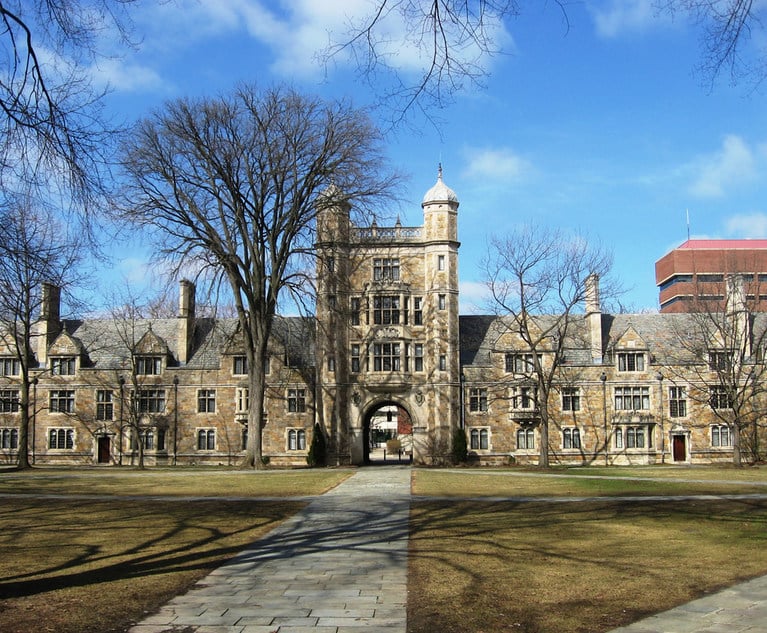First Law School for Tribal Attorneys in Nascent Stages
The hope is to create a law school that will produce lawyers and judges with the language and legal skills to preserve the tradition of the Navajo courts.
January 16, 2020 at 05:02 PM
5 minute read
 Stacy Leeds. (Courtesy photo.)
Stacy Leeds. (Courtesy photo.)
A Navajo college in Arizona hopes to establish the country's first tribal law school.
Officials at Diné College last month convened a two-day symposium of tribal law experts and Navajo leaders to discuss plans for the new school, which would be located at the college's main campus in Tsaile, Arizona, on Navajo land near the New Mexico border.
The venture is still in the early phases. Officials have yet to determine what the curriculum would look like, how the school would be accredited, or what it would be named, among other things. But supporters say there is a need for a school that can train lawyers to practice within tribal settings.
Tribal courts have jurisdiction over tribal land and some operate very differently from state and federal courts. More than 100 such courts are in the U.S, with the largest concentrations in Alaska, Arizona, California and Oklahoma, according to the Tribal Law and Policy Institute.
But the Navajo Nation's court system is by far the largest, said Stacy Leeds, vice chancellor for economic development at the University of Arkansas and the first Native American woman to become a dean of a law school. Its docket handles about 50,000 cases annually. (Tribal courts typically have jurisdiction over most criminal and civil matters that arise on tribal lands.)
"They have a very mature and deep judicial system," said Leeds, who is serving on an advisory committee examining the possible law school. "One reason why I think [the law school] is so critical for them is the rest of Indian country looks to them as one of the few places where their own law, language, customs and procedures—across the board—remain intact. They're at a pretty critical point where they're going to have to do something pretty profound to protect that."
Many judges within the Navajo Nation's tribal courts don't have law degrees, said Diné College spokesman George Joe. But more recent judicial appointments have gone to lawyers with formal law degrees, he noted, and demand for lawyers and judges who understand Navajo law and can read Navajo is on the rise, he said. Some Navajo laws and court filings are written in that language.
"There's a need for people to understand Navajo law, and who better to undertake Navajo Law than Navajos themselves?" Joe said.
Diné College officials said hopes for a law school have been around since the campus was established in 1968, when it was the first higher education institution controlled by a Native American tribe. The college now has six campuses across Arizona and New Mexico. It has about 1,500 students, most of whom are Navajo, and offers 10 bachelor's degrees and 18 associate's degrees. The proposed law school would be its second graduate-level degree if plans for a master's in business administration come to fruition first, according to Joe.
A number of traditional law schools offer specialized programs in Indian or Tribal law, including the University of Arizona James E. Rogers College of Law; Arizona State University Sandra Day O'Connor College of Law; The University of California at Los Angeles School of Law; the University of New Mexico School of Law; and the University of Colorado Law School. Some schools such as University of Kansas School of Law; Washburn University School of Law; and the University of Montana Alexander Blewett III School of Law offer tribal or indigenous law clinics.
But Diné administrators say they envision a program that goes beyond what is taught at traditional law schools. Indian law programs at traditional law schools don't adequately prepare laws student to practice within tribal courts, Leeds said.
"A traditional three-year [American Bar Association] law school experience does not equip you to go be a full-time practitioner in tribal court," Leeds said. "There are a lot of things you'd have to learn on your own or from the tribe."
Diné College officials are considering many different options for the structure of the law school and how it would be accredited, Leeds said. The new school would not necessarily require ABA accreditation, since practitioners within the Navajo Nation tribal courts needn't be admitted to any state bars. Rather, the Navajo Nation maintains its own bar exam that practitioners must pass. Hence, members of federally recognized tribes do not need to graduate from an ABA-accredited law school as long as they pass the Navajo bar exam. Those who aren't memberd of such tribes, however, must graduate from an ABA-accredited law school, be admitted in their state, and pass the Navajo bar.
There is no established timeline for opening the new law school, Joe said, and it's unclear how many students it would likely serve. But Leeds said such a school could also offer a legal foundation for aspiring lawyers from other tribes, even if it's focused primarily on Navajo law. That's especially relevant in the arena of how tribal law interacts with federal law, given how often jurisdictional questions arise.
This content has been archived. It is available through our partners, LexisNexis® and Bloomberg Law.
To view this content, please continue to their sites.
Not a Lexis Subscriber?
Subscribe Now
Not a Bloomberg Law Subscriber?
Subscribe Now
NOT FOR REPRINT
© 2025 ALM Global, LLC, All Rights Reserved. Request academic re-use from www.copyright.com. All other uses, submit a request to [email protected]. For more information visit Asset & Logo Licensing.
You Might Like
View All
Florida Law Schools Are Seeing a Bump in Applications for 2025, After Recent Declines at Flagship Schools
3 minute read

Law School Applications are Up Across the Country. Law Deans Aren't Sure Why
6 minute read
Librarian's Termination Violated First Amendment Protections, Lawsuit Claims
3 minute readTrending Stories
- 1On The Move: Squire Patton Boggs, Akerman Among Four Firms Adding Atlanta Partners
- 2Is the Collateral Order Doctrine About to Have a 'Brat Summer'?
- 3Trump Administration Faces Lawsuit Over USAID Stop-Work Orders
- 4Legaltech Rundown: Davis Wright Tremaine Announces CodeX Partnership, AAA Brings on Maya Markovich as VP, and More
- 5State Appellate Court Settles Fee Battle Between Former Co-Counsel in Patent Litigation
Who Got The Work
J. Brugh Lower of Gibbons has entered an appearance for industrial equipment supplier Devco Corporation in a pending trademark infringement lawsuit. The suit, accusing the defendant of selling knock-off Graco products, was filed Dec. 18 in New Jersey District Court by Rivkin Radler on behalf of Graco Inc. and Graco Minnesota. The case, assigned to U.S. District Judge Zahid N. Quraishi, is 3:24-cv-11294, Graco Inc. et al v. Devco Corporation.
Who Got The Work
Rebecca Maller-Stein and Kent A. Yalowitz of Arnold & Porter Kaye Scholer have entered their appearances for Hanaco Venture Capital and its executives, Lior Prosor and David Frankel, in a pending securities lawsuit. The action, filed on Dec. 24 in New York Southern District Court by Zell, Aron & Co. on behalf of Goldeneye Advisors, accuses the defendants of negligently and fraudulently managing the plaintiff's $1 million investment. The case, assigned to U.S. District Judge Vernon S. Broderick, is 1:24-cv-09918, Goldeneye Advisors, LLC v. Hanaco Venture Capital, Ltd. et al.
Who Got The Work
Attorneys from A&O Shearman has stepped in as defense counsel for Toronto-Dominion Bank and other defendants in a pending securities class action. The suit, filed Dec. 11 in New York Southern District Court by Bleichmar Fonti & Auld, accuses the defendants of concealing the bank's 'pervasive' deficiencies in regards to its compliance with the Bank Secrecy Act and the quality of its anti-money laundering controls. The case, assigned to U.S. District Judge Arun Subramanian, is 1:24-cv-09445, Gonzalez v. The Toronto-Dominion Bank et al.
Who Got The Work
Crown Castle International, a Pennsylvania company providing shared communications infrastructure, has turned to Luke D. Wolf of Gordon Rees Scully Mansukhani to fend off a pending breach-of-contract lawsuit. The court action, filed Nov. 25 in Michigan Eastern District Court by Hooper Hathaway PC on behalf of The Town Residences LLC, accuses Crown Castle of failing to transfer approximately $30,000 in utility payments from T-Mobile in breach of a roof-top lease and assignment agreement. The case, assigned to U.S. District Judge Susan K. Declercq, is 2:24-cv-13131, The Town Residences LLC v. T-Mobile US, Inc. et al.
Who Got The Work
Wilfred P. Coronato and Daniel M. Schwartz of McCarter & English have stepped in as defense counsel to Electrolux Home Products Inc. in a pending product liability lawsuit. The court action, filed Nov. 26 in New York Eastern District Court by Poulos Lopiccolo PC and Nagel Rice LLP on behalf of David Stern, alleges that the defendant's refrigerators’ drawers and shelving repeatedly break and fall apart within months after purchase. The case, assigned to U.S. District Judge Joan M. Azrack, is 2:24-cv-08204, Stern v. Electrolux Home Products, Inc.
Featured Firms
Law Offices of Gary Martin Hays & Associates, P.C.
(470) 294-1674
Law Offices of Mark E. Salomone
(857) 444-6468
Smith & Hassler
(713) 739-1250








